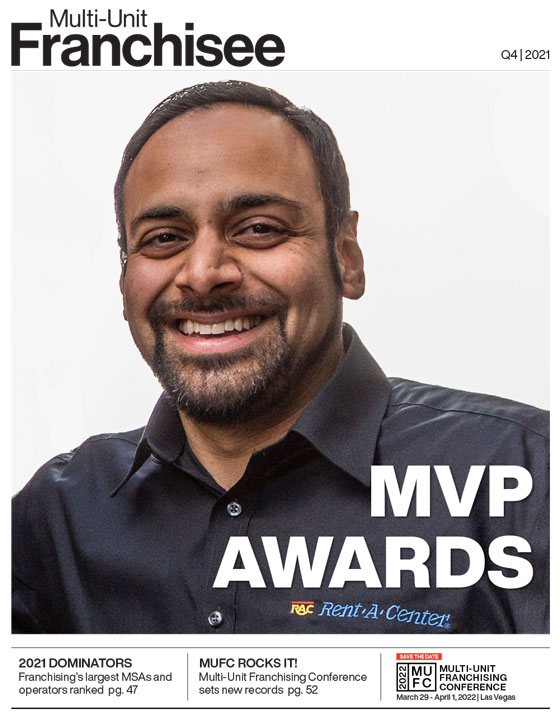Passing It On: 3 options for succession planning in a post-Covid world

As franchising continues to recover and evolve from Covid-19, and with renewed caution surrounding the delta variant, the primary focus for management teams has been on operations. Everyone is exhausted from dealing with crisis-like staffing and recruiting efforts, supplier interruptions, strained cash flows, and changing local and national Covid mandates and recommendations.
While everyone is tired, it is important that both franchisors and franchisees not neglect long-term plans and planning opportunities and prioritize the evaluation and review of their estate and succession plans. This is especially true now, with business valuations in flux because of the pandemic and potential impending tax reform in Washington. Companies and franchise owners should review capital structures with debt and equity partners and ensure alignment around the planning and execution of potential exit strategies in conjunction with succession plans.
Franchise owners have all been significantly affected by the pandemic. In many cases owners are still managing through decreased cash flows as their businesses have not fully recovered. Some declines are staffing-related, others are specific to certain segments more negatively affected than others. These include full-service dining, health and fitness, and other businesses where customers congregate in defined indoor locations.
On the other hand, businesses with drive-thru access, state-of-the-art digital platforms, and early and innovative adapters of enhanced takeout and delivery platforms thrived. These shifts within the market can have a material effect on the timing and execution of a successful succession plan.
As an initial step, franchise owners should review current business valuations and capital structures. A lot has changed during Covid. Some owners are more eager to sell, others are taking a longer view o their brands, portfolios, and expansion opportunities. In businesses with multiple partners or institutional ownership, exit parameters and the outlook may have changed.
In some segments, banks and capital providers will support continued growth with modest equity or embedded equity. In others, growth will be more challenging and require a more significant equity component. In challenged brands with uneven performance, a sale might now require partial financing by the seller. If your company is in expansion mode, ensure that lenders will support your efforts. Financial institutions and capital partners also were affected by the pandemic.
As franchisees and brand owners review alternatives, one of the primary inputs is where the owner is in the life cycle of their business. Is the owner in a position to sell, financially and emotionally? Does the business have financial partners, and how do their timetables and goals align? As owners evaluate alternatives, there are three primary options to consider when assessing succession planning and liquidity event alternatives.
1) Transfer of business to the next generation. For family-owned companies, the best plan may be to hold onto the business and transfer it down to children or the next generation of ownership. Often the goal is to transfer ownership in a business to children over time through gifting, with as minimal a tax impact as possible to the owner’s estate. Based on uneven performance throughout Covid and continued uncertainty around future variants, for businesses adversely affected by the pandemic, now may be an ideal time to take advantage of dips in valuations and to make a gift of an interest in the business and/or accelerate future gifts for tax purposes.
Other factors to consider when deciding whether transferring your business to the next generation include: Do they even want to run the family business? And do they have the skill sets to continue to successfully operate it? The last thing any owner wants to see is their business fail in the hands of their children and for value to be lost, when a better alternative would have been to sell to a third party.
2) Partner buyouts. For businesses with multiple shareholders or partners, another succession planning alternative is for an owner to transfer or sell their interest to one or more of the remaining shareholders or partners. This can be an ideal solution when individuals in ownership groups have different investment timelines and/or goals. Planning and execution of partner or shareholder buyouts can also be done with much greater certainty around timing and value, as deal terms can be agreed upon ahead of time and are not dependent on the unknowns of a third-party buyer. Valuation, though, can be tricky. Is the business valued as a going concern, or as it would be in a sale to a third party? If real estate is involved, liquidity events can be bifurcated between enterprise and real estate assets. The flexibility of real estate alternatives and more definitive valuations often can be used to find a solution. Plan a timeline for approaching your partner(s) and getting a sale done. Propose a solution; plan before approaching other stakeholders.
3) Third-party sale. Running a process to maximize value in a third-party sale may represent the best alternative for companies and franchise owners. While current franchise M&A market conditions vary widely across brands, geographies, and industry segments, the continued strong performance of some brands throughout Covid, with increasing sales and expanded margins, has resulted in higher valuation multiples and broader pools of buyers. Increased franchisor involvement in buyer selection makes planning for franchisor approval often the most critical component of the M&A process. When do a seller and buyer involve the franchisor, and at what level?
Regardless of the ultimate path or combination of paths a company or franchise owner chooses, it is important to have a succession plan in place and to continue to reevaluate that plan in light of changing business and market conditions.
Carty Davis is a partner with C Squared Advisors, a boutique investment bank that has completed hundreds of transactions in the multi-unit franchise and restaurant space. Since 2004 he’s been an area developer for Sport Clips in North Carolina with more than 70 units. Contact him at 910-528-1931 or [email protected].
Share this Feature
Recommended Reading:
FRANCHISE TOPICS
- Multi-Unit Franchising
- Get Started in Franchising
- Franchise Growth
- Franchise Operations
- Open New Units
- Franchise Leadership
- Franchise Marketing
- Technology
- Franchise Law
- Franchise Awards
- Franchise Rankings
- Franchise Trends
- Franchise Development
- Featured Franchise Stories
FEATURED IN

Multi-Unit Franchisee Magazine: Issue 4, 2021

$286,727
$750,000





 The multi-unit franchise opportunities listed above are not related to or endorsed by Multi-Unit Franchisee or Franchise Update Media Group. We are not engaged in, supporting, or endorsing any specific franchise, business opportunity, company or individual. No statement in this site is to be construed as a recommendation. We encourage prospective franchise buyers to perform extensive due diligence when considering a franchise opportunity.
The multi-unit franchise opportunities listed above are not related to or endorsed by Multi-Unit Franchisee or Franchise Update Media Group. We are not engaged in, supporting, or endorsing any specific franchise, business opportunity, company or individual. No statement in this site is to be construed as a recommendation. We encourage prospective franchise buyers to perform extensive due diligence when considering a franchise opportunity.